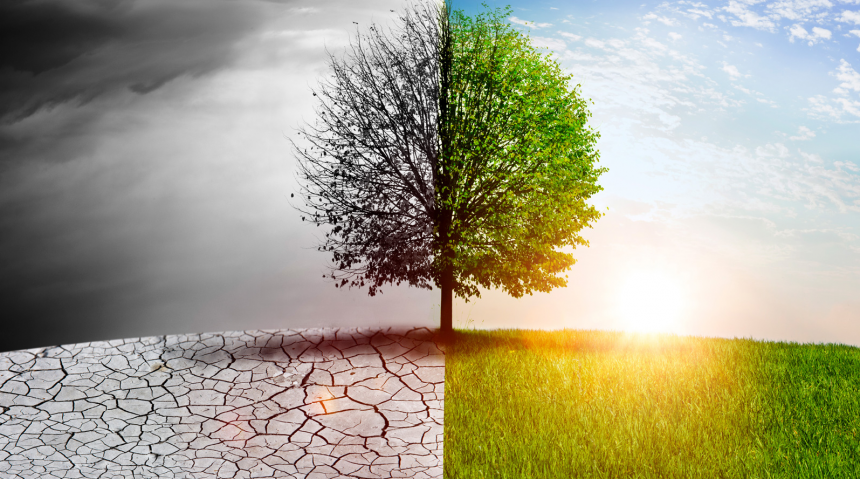PART – 1
Climate change (CC) is an issue of global concern with alarming consequences for human civilisation, economy and ecosystems. The climate of earth has been changing for almost a million years or so, but the current rate of change is significantly rapid than, what can be explained only by natural processes. There is overwhelming consensus among scientists that human activities are the principal driver behind the accelerating pace of climate change.
What is climate change? The term climate change as it is used today, referring to human-caused changes to the Earth’s climate, was popularized in scientific literature in 1970s, particularly after a paper by Wallace Broecker titled “Climatic change: Are we on the brink of a pronounced global warming?” published in Science journal in 1975.
Later, the formation of the IPCC in 1988 also played a significant role in promoting this term. It is a comprehensive term thatrefers to long-term shifts in temperatures and weather patterns. For getting down to the nitty-gritty of climate change one should be fully acquainted with the concept of global warming that acts as a primary factor in the former.
Earlier the CC used to be due to natural phenomena like large volcanic eruptions or changes in sun’s activity but since industrial revolution of 1800s, human activities have been the main driver of climate change, primarily due to burning of fossil fuels like coal, oil and gas. Initially ignored, the CC has now taken the shape of Frankenstein’s monster that killed its innovator. If not dealt with seriousness and swiftness, this anthropogenic risk creation will make the life on earth unsustainable.
There is a delicate balance between the incoming shortwave solar radiations and the outgoing long wave radiations that maintains earth’s surface temperature at a level sufficient to support life on the planet. This balance is maintained by some gases called greenhouse gases (CO2, methane and nitrous oxide) present in the earth’s atmosphere in trace amounts which partially trap the outgoing heat radiations of the earth, do not allow them to escape fully into the space, thereby raising the temperature on the earth’s surface to a liveable extent, the phenomenon commonly known as the greenhouse effect.
However, burning fossil fuels relentlessly and prodigiously generates greenhouse gases in enormous quantity that act like a thick blanket wrapped around the earth, trapping the outgoing heat wave radiations of the earth to a larger extent and raising temperatures significantly thereby leading to enhanced greenhouse effect. The average temperature of the earth’s surface is now about 1.2degree Celsius warmer than it was before industrial revolution.
Many people think climate change is primarily increase in temperatures like global warming, but temperature rise is only the beginning of the story. The consequences of CC now include, among others, intense drought, water scarcity, severe fires, rising sea levels, flooding, melting polar ice and mountain glaciers, catastrophic storms and declining biodiversity.
Even oceans are not immune to enhanced global warming. Their overall health depends critically on dissolved oxygen which is getting increasingly impacted by increasing temperatures. The Arctic and subarctic regions are experiencing exceptionally rapid warming, known as Arctic amplification which accelerates de-oxygenation in Arctic Ocean, thereby greatly threatening marine ecosystems.
Since the beginning of 21st century global Greenhouse gas (GHG) emissions have followed an increasing trend, with exception to 2020 when it decreased by 3.7% as compared to 2019 levels due to covid-19 pandemic, due to the increasing emissions from China and other emerging economies,. The six biggest emitters (China, USA, India, EU, Russia and Brazil) together account for more than half of all global greenhouse gas emissions.
China alone constitutes more than 29% of the total GHG emissions followed by United States that contributes slightly higher than 11%. While the GHG emissions by European Union and Russia demonstrated a significant relative decrease among the top emitting economies, the GHG emissions by China and India have increased by 285% and 170% respectively from 1990 to 2022 (JRC 2023).
Every fraction of a degree of warming matters. With every additional increment of global warming, changes in extremes and risks become larger. For example, every additional 0.1 degree Celsius of global warming causes clearly discernible increases in temperature and precipitation extremes, as well as agricultural and ecological droughts in some regions (IPCC).
Limiting global warming to below 1.5 degree Celsius will significantly reduce the risks, adverse impacts, and related losses and damages from climate change. Failing to do so will lead to increasingly frequent and dangerous extreme weather events (IPCC). Extreme heat causes the greatest mortality of all extreme weather, with an estimated 489,000 heat related deaths per year (WHO).
Exceeding 1.5 degree Celsius could also trigger breakdown of major ocean circulation systems, and collapse of tropical coral reef systems – with abrupt, irreversible, and dangerous impacts for humanity (Science).Even at current levels of global warming, we are already seeing devastating climate impacts. In the last two decades, the most-climate-vulnerable economies alone have experienced climate damages exceeding UD$500 billion (UNEP).
The scientific evidence is unequivocal: climate change is a threat to human wellbeing and the health of the planet. Any further delay at global level will lead to missing the brief, rapidly closing window to secure a liveable future. There will be more droughts and heat waves besides longest wildfire season. Hurricanes will become stronger and more intense. Changes in precipitation patterns will be very common with some locations experiencing increased precipitation and flooding, while others suffering from drought. Arctic is very likely to become ice-free before mid-century.
(To be continued…)
(Author is Principal (Rtd.) J&K Higher Education Department. Email: [email protected])










